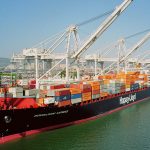How to Use Incoterms to Define Your Shipping Terms and Responsibilities
This is a guest post by Juan Turcios.
Smoothly navigating international trade requires mastering your approach to using Incoterms to define your shipping terms and responsibilities. Therefore, let’s explore the world of Incoterms, unlocking their power to streamline your global business operations and offering clarity in your import and export endeavors.

Understanding Incoterms
When doing international shipping, understanding Incoterms is essential. These three-letter abbreviations, like FOB and CIF, serve as codes that define responsibilities and costs in a trade transaction. Incoterms specify who is responsible for transportation, insurance, and customs clearance tasks. By grasping the significance of Incoterms, you can avoid misunderstandings, reduce risks, and negotiate more effectively with your trading partners.
These terms help clarify global commerce, safeguarding buyers’ and sellers’ understanding of their roles and obligations. Thus, whether you’re an importer or exporter, mastering using Incoterms guarantees successful international trade.
Key Incoterms Explained: EXW and FOB
Two key Incoterms, EXW (Ex Works) and FOB (Free On Board) play significant roles in international trade. EXW places the responsibility on the buyer, as the seller’s obligations end once the goods are made available at their premises. This option gives buyers control but requires more logistics effort. In contrast, FOB transfers responsibility to the seller until the goods are loaded onto the ship.
FOB is commonly used for sea freight, and it simplifies the process for buyers by involving the seller in the transportation process. When deciding between EXW and FOB, consider factors like your familiarity with the shipping process, logistical capabilities, and risk tolerance. EXW may suit experienced importers, while FOB provides a smoother transition for newcomers to international trade, making choosing the right Incoterm for your specific situation crucial.
Key Incoterms Explained: CIF and DDP
Two important Incoterms in international trade are CIF (Cost, Insurance, and Freight) and DDP (Delivered Duty Paid). CIF places the seller’s responsibility to cover transportation and insurance costs until the goods reach the port of destination. This option is beneficial for buyers as it minimizes risk. On the other hand, DDP makes the seller responsible for all costs, including duties and taxes, until the goods are delivered to the buyer’s location.
DDP offers convenience to the buyer but requires significant effort from the seller. When deciding between CIF and DDP, consider factors like your familiarity with international trade regulations, your ability to handle customs clearance, and your risk tolerance. CIF is suitable when you want to control the transportation and insurance aspects, while DDP simplifies the process for buyers by offering a comprehensive solution.
Avoiding Common Pitfalls
Avoiding common pitfalls when you use Incoterms to define your shipping and responsibilities is important for successful logistics risk mitigation. Misunderstandings, documentation errors, and misapplied Incoterms can lead to costly disputes. Establishing clear communication with your trading partners to avoid these issues is important. Verify that both parties fully understand the chosen Incoterms and their respective responsibilities. Thoroughly document all aspects of the transaction, including contracts, invoices, and shipping records.
In addition, stay informed about ever-evolving trade regulations and customs procedures to prevent compliance issues. Finally, consider working with experienced professionals or logistics experts who can offer guidance in navigating complex international trade scenarios. By proactively addressing these common pitfalls, you can reduce risks, improve efficiency, and build stronger relationships with your international business partners, certifying the smooth flow of goods across borders.
Negotiating Incoterms in Your Contracts
Negotiating Incoterms in your contracts is an important step in establishing clear terms and expectations in international trade. When finalizing agreements with your trading partners, engaging in open and transparent discussions regarding the chosen Incoterms is essential. Check that both parties are on the same page, fully understanding their roles and responsibilities throughout the shipping process.
Seek legal counsel to draft contracts that accurately reflect the agreed-upon Incoterms and mitigate any potential disputes if necessary. Effectively negotiating Incoterms can help prevent misunderstandings, reduce risks, and lead to smoother international trade operations. Clear and well-negotiated Incoterms strengthen partnerships, fostering trust and cooperation in the global business landscape! Therefore, invest the time and effort needed to get your Incoterms right in your contracts, and it will pay off in the long run.
Use Incoterms to Define Your Shipping Terms and Responsibilities: Logistics and Storage Solutions
Logistics and storage play an important role in supporting the use of Incoterms in international trade. That is where a trusted partner like Helix Moving & Storage DC can make a significant difference. They offer top-notch moving and storage services tailored to the unique needs of businesses engaged in global trade. At the same time, they provide state-of-the-art storage facilities in DC, and not only, with climate control and 24/7 security, providing safety and integrity for your products.
However, when selecting storage and logistics solutions for your goods, also consider factors such as the location of the storage facility, security measures, and accessibility. Whether temporarily storing inventory or needing assistance with transportation and warehousing, a good partner can always help streamline your supply chain.
Documenting Incoterms in Your Transactions
Properly documenting Incoterms in your transactions is fundamental to improving your import and export logistics. Including these terms in your contracts, invoices, and shipping documents helps all parties understand their roles and responsibilities. Accurate documentation helps prevent disputes and facilitates the smooth movement of goods across international borders.
In addition, maintaining organized records of past transactions can be invaluable for future reference and analysis. You demonstrate professionalism and contribute to efficient and compliant international trade operations by consistently documenting Incoterms in your transactions. Make it a standard practice in your business, and you’ll find that it enhances your import and export logistics.
Using Technology to Manage Incoterms
Leveraging technology to use Incoterms is a great approach in today’s global marketplace. Advanced software solutions can streamline choosing and implementing Incoterms for international trade transactions. These tools help you select the most suitable terms and automate tasks like generating compliant documentation. Technology enhances the efficiency and accuracy of your supply chain operations by reducing manual work and the risk of errors.
Additionally, these platforms often provide access to up-to-date information on trade regulations and industry best practices, keeping you compliant. Embracing technology in Incoterms management guarantees you stay competitive, minimize risks, and optimize your import and export logistics.
The Boons of Mastering Incoterms
Harnessing the knowledge of how to use Incoterms to define your shipping terms and responsibilities is pivotal for success in international trade. Making solid choices and having mutual understanding with your partners can minimize risks, reduce disputes, and optimize your import and export logistics. So, embark on this journey confidently, knowing that mastering Incoterms will propel your global business endeavors toward prosperity.
This was a guest post by Juan Turcios.
Author Bio
Juan Turcios is a seasoned expert in the transportation and moving industry, with a keen focus on the intricacies of international shipping and logistics. His extensive experience in the field is reflected in his in-depth knowledge of Incoterms and their practical applications in global trade. Juan’s insights are invaluable for businesses that streamline their import and export operations, ensuring compliance and efficiency in a complex international market.





